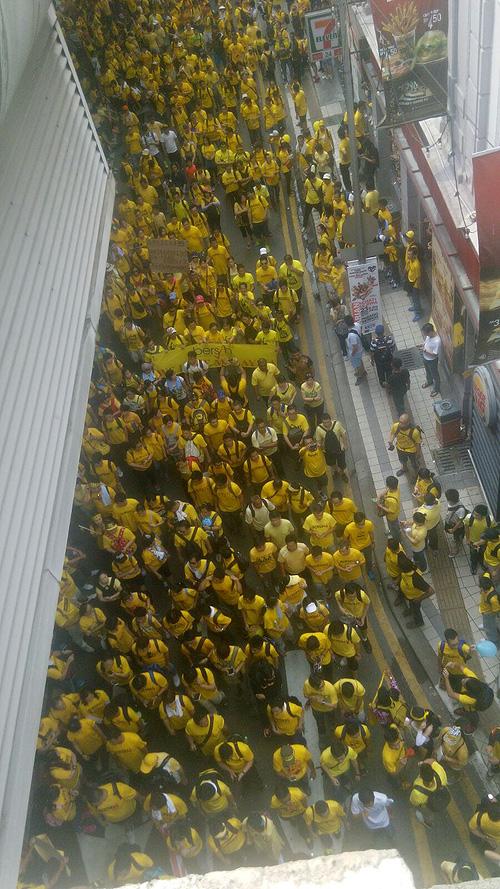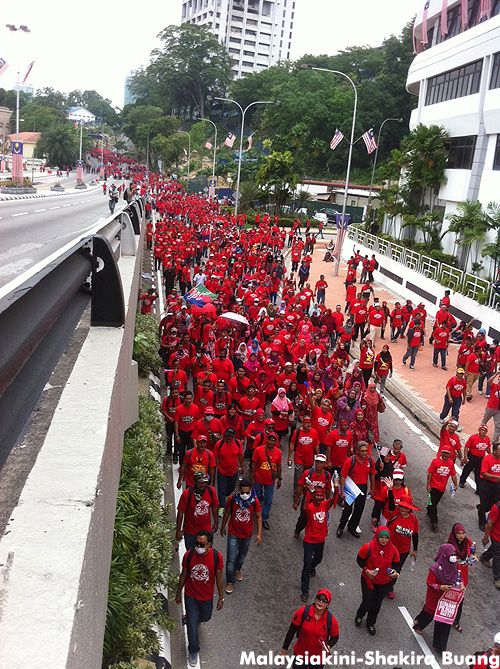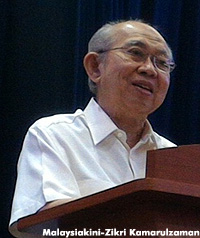MP SPEAKS Former prime minister Dr Mahathir Mohamad, in his talk at the hi-tea organised by the Pusat Bandar Taman Cempaka Umno Branch yesterday, urged Malays to emulate their Chinese counterparts in making their case against Prime Minister, Najib Razak, by transcending party lines when their interests are under threat.
Mahathir is mistaken in his interpretation of the motives and meaning of the results of the 13th general election in 2013 when he implied that the Chinese voters “forget their party interests” if the interests of their race are threatened.
For Mahathir’s information, national interests transcending communal interests were the primary consideration for the Malaysian Chinese who voted in the 13th general election - not just for DAP, but for Pakatan Rakyat candidates including candidates from PKR and PAS.
This was why the Chinese voters elected Malay MPs from Pakatan Rakyat parties, rejecting Chinese candidates from MCA.
This is what a mature democracy and a Malaysian-centric electorate should do; place national interests above personal, party and communal considerations.
We have just marked the 58th year of Merdeka and 52nd year of the formation of Malaysia.
Is it still too premature to expect an increasing number of Malaysians who are capable of rising above personal, party and communal interests to be guided and motivated by national interests?
Towering Malaysians
We had many towering Malaysians in the early decades of the nation who rose above personal and ethnic considerations to serve the nation.
 We just lost one such towering Malaysian, the late Yuen Yuet Leng (
photo
), one of the nation’s top cops who had a bullet lodged near his heart for more than half-a-century till his last breath as a testimony of his professionalism and patriotism.
We just lost one such towering Malaysian, the late Yuen Yuet Leng (
photo
), one of the nation’s top cops who had a bullet lodged near his heart for more than half-a-century till his last breath as a testimony of his professionalism and patriotism.
Why have towering Malaysians decreased over the decades as if becoming an extinct species, with more and more becoming just Malays, Chinese, Indians, Kadazans and Dayaks, even ethnic champions, instead of becoming Malaysians, towering or otherwise?
The 34-hour Bersih 4 rally on the eve of the 58th Merdeka anniversary was a great milestone in Malaysian nation-building, where hundreds of thousands of Malaysians regardless of race, religion, region, age, gender or even politics converged in Kuala Lumpur for a common national cause transcending race – demand for good governance and clean, free and fair elections.
Although unlike Bersih 1, 2 and 3 rallies where the Malays were a clear majority, Malays for various reasons were in a minority in Bersih 4 rally but doubled their representation from 20 percent on the first day to 40 percent on the second day, the “yellow shirt” gathering was completely different from the Sept. 16 Red Shirts rally in terms of ethnic and national consciousness.
 In the 34-hour Bersih 4 rally, whether on the first day when Malays were 20 percent or the second day when Malays doubled to 40 percent, there was no tinge of racialism or racial consciousness, and no one, whether Chinese, Malays, Indians, Kadazans or Ibans, felt threatened or behaved in a threatening manner on account of his or her race.
In the 34-hour Bersih 4 rally, whether on the first day when Malays were 20 percent or the second day when Malays doubled to 40 percent, there was no tinge of racialism or racial consciousness, and no one, whether Chinese, Malays, Indians, Kadazans or Ibans, felt threatened or behaved in a threatening manner on account of his or her race.
Instead of praising and celebrating the maturing of Malaysian nation-building and democracy, where hundreds of thousands of race and religion could gather peacefully for a common national purpose without any racial fear or tensions whatsoever, the Umno/BN government decided to launch a campaign to demonise, defame and communalise the Bersih 4 rally, with MCA and Gerakan leaders instigating Umno extremist fringes to respond in a provocative and racist manner, like the Sept 16 red shirt rally.
The four hour red shirt rally was clearly a totally different kettle of fish, as right from the announcement of the planned rally after the 34-hour Bersih 4 rally, the atmosphere was thick with threats of racial incidents and conflicts, accompanied by graphic images of a racial “bloodbath”, causing Malaysians all over the country in the following fortnight to worry whether would be racial clashes in Kuala Lumpur on Sept 16.
If there had been towering Malaysians in the cabinet, ministers whether from Umno or the BN coalition would have visited Jalan Petaling to calm the jittery traders and businesses and assure them of peace and order, instead of the fear and insecurity enveloping the area, leading to the closure of 500 shops and over 700 traders staying away from Jalan Petaling on Sept 16 for safety reasons.
 No minister, even from MCA and Gerakan, visited Jalan Petaling in the week leading to the red shirt rally to calm the businesses and traders, but Umno ministers and deputy ministers were conspicuous in their attendance at the red shirt rally to give their support.
No minister, even from MCA and Gerakan, visited Jalan Petaling in the week leading to the red shirt rally to calm the businesses and traders, but Umno ministers and deputy ministers were conspicuous in their attendance at the red shirt rally to give their support.
With the approach of the 60th Merdeka anniversary, the time has come for the re-emergence of towering Malaysians like Yuen Yuet Leng, who had before his death, confided to his old friends his disappointment at the fractured state of racial relations in the country.
Malaysians, and in particular leaders in all sectors of the country, should cease and desist from trying to communalise issues and events in the country.
For instance, the hottest topic in conversational circuits in the country today is whether there would be “no confidence motion” against the prime minister and whether Najib could survive the motion, a topic made more intriguing with the open support by the former longest-serving MCA President Dr Ling Liong Sik to Mahathir’s call for the ouster of Najib as prime minister.
'Falsely confident'
Najib may be falsely confident that he would not have to face a “no confidence” vote in Parliament, believing that he had taken adequate safeguards by ensuring that the speaker would not allow such a motion and that he had the unquestioned loyalty of Umno/BN MPs with promises of more financial allocations for them.
But Najib may be counting his chickens before they are hatched.
Be that as it may, there should not be any attempt to communalise any “no confidence” against Najib.
Whether Najib is ousted as prime minister or Umno replaced as the leading political party in the government coalition, Malay political power is not threatened as a new prime minister will be a Malay and new coalition will be Malay-dominated reflecting Malaysia’s demography.
 As Umno veteran Tengku Razaleigh Hamzah (
photo
) said before the red shirt rally, he did not know where the perceived threats to Malays were coming from when the government is headed by a Malay, state governments headed by Malays with the exception of Penang, the civil service is mostly made up of Malays, the army are mostly Malays and there are also the Malay rulers.
As Umno veteran Tengku Razaleigh Hamzah (
photo
) said before the red shirt rally, he did not know where the perceived threats to Malays were coming from when the government is headed by a Malay, state governments headed by Malays with the exception of Penang, the civil service is mostly made up of Malays, the army are mostly Malays and there are also the Malay rulers.
Malaysia’s foremost civil rights activist, Zainah Anwar, had also recently questioned where the “threat to the Malays” comes from, after 58 years of Umno rule, why, after more than four decades of the New Economic Policy, are (i) 75.5 percent of those at the bottom are Malays; (ii) some 90 percent of the unemployable university graduates Malays; and (iii) of the RM54 billion worth of shares pumped to Malay individuals and institutions between 1984 and 2005, only RM2 billion remain in Malay hands today.
Can Malaysians move beyond race to become the Malaysian nation?
LIM KIT SIANG is the DAP parliamentary leader and MP for Gelang Patah.

